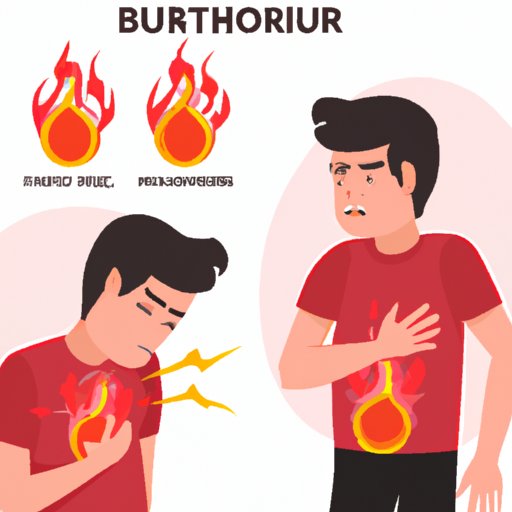
Introduction: Why Heartburn Symptoms are important
Heartburn is a medical condition that affects millions of people around the world. While it is a common ailment, the number of individuals suffering from it seems to be on the rise. It is important to learn about heartburn symptoms because it can be an indication of a serious underlying health issue. This article will provide you with an overview of not only the most common symptoms of heartburn, but also some of the lesser-known, yet equally critical ones. In addition, we will discuss how to identify, treat and prevent heartburn through lifestyle changes.
10 Surprising Facts About Heartburn Symptoms You Need to Know
Not everyone knows these surprising facts about heartburn symptoms, which is why medical attention is crucial in understanding, identifying, and treating heartburn symptoms. Untreated, it can lead to complications like esophagitis, Barrett’s esophagus, and esophageal stricture. Here are some of the surprising facts you need to keep in mind:
- Heartburn can be caused by food or lifestyle habits.
- Heartburn is not just for adults: children and infants can develop it too.
- Aspirin and other medications can lead to heartburn
- Heartburn can lead to long-term throat damage
- Being overweight can also be a factor in developing heartburn
- Wearing tight clothes can exacerbate the conditions for heartburn.
- Carbonated beverages can increase heartburn symptoms.
- Heartburn can be classified as either mild or severe.
- Heartburn can be a sign of more serious medical conditions.
- People who smoke are more susceptible to heartburn.
Don’t Ignore These Warning Signs: Common Symptoms of Heartburn
Heartburn can happen to anyone and everyone, and some of its common symptoms include:
- Acid reflux – A disease that causes the acid contents of your stomach regurgitate into the esophagus.
- Chest pain – It feels like squeezing and is sometimes confused with a heart attack.
- Difficulty or pain when swallowing – This symptom causes discomfort or pain when swallowing.
- Regurgitation – This occurs when the backwash of acid-induced foods comes back to the mouth.
- Sore throat – This happens when heartburn causes stomach acid to irritate your throat.
- Hoarseness – Byproducts of acid reflux may irritate your vocal cords. This is why your voice may sound hoarse or weak.
Understanding The Physical and Emotional Symptoms of Heartburn: A Comprehensive Guide
The physical symptoms of heartburn can be easily treated if they are caught early. The emotional symptoms, on the other hand, can take a little bit more work to address. Here are some of the physical and emotional symptoms to watch out for:
- Physical symptoms include stomach cramps, bloating, constipation, diarrhea, and nausea.
- Emotional symptoms include stress, anxiety, depression, and fatigue.
- Stress and anxiety are known triggers for heartburn symptoms.
- Anger, frustration, and other negative emotions can contribute to heartburn symptoms.
- If you experience constant heartburn, it may lead to other long-term medical problems.
How to Identify and Treat Heartburn Symptoms
Identifying heartburn symptoms is the first step to finding relief. You can make some simple lifestyle changes that can alleviate your discomfort, including:
- Avoiding food triggers that can aggravate your heartburn symptoms.
- Eating slowly and taking smaller bites so that your stomach can digest your food properly.
- Watching your posture, as core strengthening exercises can help prevent heartburn.
- Limiting your intake of carbonated beverages and alcohol.
- As much as possible, avoid taking aspirin or other irritating medications.
- Opting for home remedies which include drinking ginger tea or consuming chewing gum.
- If home remedies don’t work, it’s best to consult your doctor on which antacids are available in the market that may provide relief to your heartburn problems.
Heartburn: Symptoms, Causes, and Risk Factors
The primary cause of heartburn symptoms is the backflow of stomach acid into the esophagus, resulting in mild to intense discomfort. Here are some common risk factors to be aware of:
- Aging – As we age, the muscles that support the stomach become weaker, increasing the risk of heartburn.
- Acidic food, especially citrus and tomatoes- These types of food trigger heartburn symptoms, and as a result, avoiding them may provide relief.
- Obesity – Research shows that people who are obese are twice more likely to develop heartburn symptoms
- Smoking – Smoking can make you more susceptible to heartburn symptoms
- Pregnancy – Hormonal changes during pregnancy can cause heartburn due to increased pressure in the abdominal area
- Stress – As mentioned earlier, stress can be a trigger for heartburn symptoms
- Sleeping habits – Laying down immediately after eating can lead to heartburn symptoms
Keep Your Heartburn Symptoms at Bay: Simple Tips and Tricks for Relief
It’s important to take measures to manage your symptoms. Some simple strategies are listed below:
- Eating smaller meals and avoiding large portions
- Avoid lying down immediately after meals
- Don’t eat within two hours before bedtime
- Avoid eating certain types of food, like spicy and acidic food
- Chewing gum or sucking on lozenges can stimulate the salivary glands, which help to neutralize acid
- If you suspect you have a medical condition, it’s best to consult a doctor to get prescribed medication or lifestyle changes advice for relief.
Conclusion
Heartburn is one of the ailments that can be easily managed through lifestyle changes. Knowing the symptoms, risk factors, and beneficial prevention tips are key to reducing the discomfort caused by heartburn. If you suspect that you have heartburn symptoms, it is best to consult a doctor immediately. This way, appropriate medical advice and interventions can be provided, and you can go back to living your life without discomfort or hindrance.





